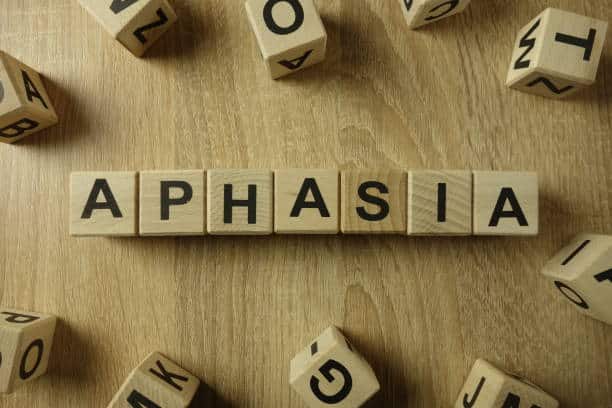Aphasia
Lisa Harris is a Consultant Speech and Language Therapist at Re:Cognition Health. She has over 25 years’ experience working in the rehabilitation of adults with communication, cognitive and swallowing difficulties resulting from neurological injury or disease. Below, Lisa gives an insight into aphasia including its causes, diagnosis, treatment pathways and practical advice for supporting an individual living with the condition:
Understanding Aphasia
Aphasia results from damage to one or more areas of the brain which control language. It can cause difficulty with speaking, understanding, reading, writing, or all of these skills to a greater or lesser degree.
When someone has previously had fluent speech, but then finds it hard to find the words they need in their own language, Expressive Aphasia may be diagnosed. Typically, there will be word finding problems, sound errors and difficulty creating meaningful sentences. For those with severe expressive aphasia, social and contextual speech is severely limited, and someone may struggle to express their basic needs and thoughts. Some may experience milder forms, where low frequency, less common words are hard to find, but they can largely communicate. When a patient has expressive aphasia, they may also have problems writing.
Receptive Aphasia effects someone’s ability to understand their own language. If severe, they will not be able to understand simple commands or phrases, if mild they may be able to process social and contextual language but struggle with more complex sentences or information. When a patient has receptive aphasia, they may also have problems reading. Expressive and receptive aphasia can occur alone or at the same time.
Causes of Aphasia:
Aphasia can happen at any age, although it is more common in people aged over 55 years.
According to Stroke Association, around a third of people experience aphasia as a result of brain damage following a stroke, when the blood supply to part of the brain that controls language is cut off, depriving the brain cells of oxygen which causes those cells to die. Other causes of aphasia can include head injury, brain tumour, brain infection or progressive degenerative neurological conditions such as Alzheimer’s and other types of dementia, including Primary progressive aphasia, which affect the part of the brain responsible for controlling language.
Aphasia Diagnosis:
When someone is concerned about the change in their speech ability, or, if they have had a sudden onset change due to a neurological event, a medical team may diagnose aphasia. At this point they will refer to a speech and language therapist. A full language assessment will be undertaken to look at all aspects of communication and to provide a diagnosis.
Aphasia Treatment:
A treatment plan is developed after a full assessment around the individual’s specific difficulties by speech and language therapists and where appropriate, neuropsychologists. Patients may benefit from treatment for their impairment and strategies to support their communication, which can involve family members where appropriate. It is essential that people who are in the lives of the person with aphasia are supported in their understanding, knowledge and ability to support communication in order to maximise and optimise the communicative setting.
Evidence has shown that many people will benefit from intensive speech and language rehabilitation. This has traditionally been provided in rehabilitation units, clinic and domiciliary settings. However, we are now able, through technology, to provide access online for a great many more patients than was previously possible, vastly increasing the possibility of at-home intensive treatment and communicative support.
How to Support Somebody Living With Aphasia:
A strong support group is hugely beneficial for the individual with aphasia and there are many techniques that can be used:
To aid understanding:
- Speak in short, concise sentences that are easy to understand
- Try to speak slowly
- Repeat questions as needed or rephrase using different words
- Remove background noise or distractions when speaking
- Check that you have been understood
To aid someone to speak:
- Stay calm and encouraging, maintain eye contact- be mindful and respectful of the effort it takes for someone to try to talk
- Allow plenty of time to find the words they need – never rush them
- Help someone stay on track- remind the individual of what they have said if they become distracted when finding a word
- Avoid open questions such as “what would you like to drink?” Instead use forced alternatives such as “would you like tea or coffee?” thus providing a model for them to repeat from
- Ask simple “yes, no” questions
- Double check that the words they have used are those they intended
- Resist the urge to correct – support them to become confident with their speech, regardless of any mistakes they are making
- Ask them to try and talk around a word that they cannot find, describe it, it’s use or how it looks
- Employ “Total communication methods” such as drawing, pointing, writing, symbol apps/technology or hand gestures
- Seek out aphasia support groups and attend meetings and events with the individual. Meeting other carers is a great source of information and provides the opportunity to share experiences and learn tips, strategies and coping mechanisms.
If you or a loved one is experiencing any early symptoms of aphasia, it’s important to receive an accurate diagnosis to understand the underlining cause and to get the right treatment pathway and support.
To arrange an appointment with Re:Cognition Health’s Brain and Mind experts, please contact our friendly team on 0800 802 1030.
 Visit our USA website
Visit our USA website





